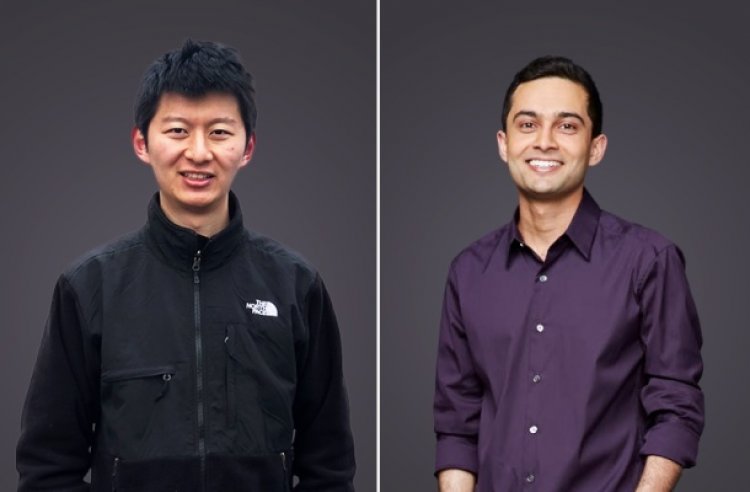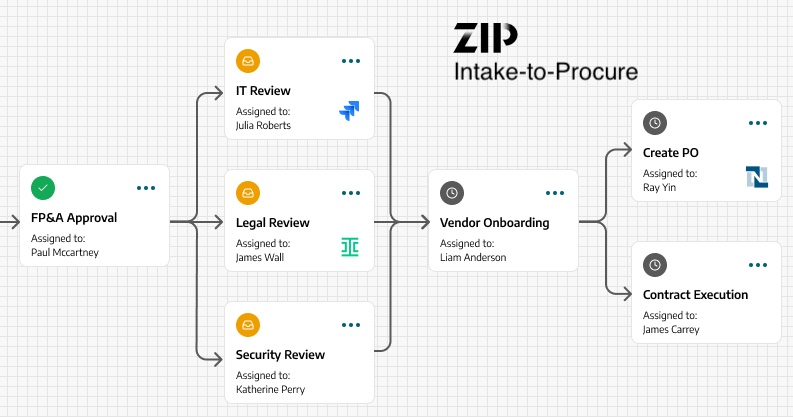Zip lines up $43M at a $1.2B valuation for its growing ‘concierge for procurement’
The process to make any purchase within a business can be long and cumbersome, involving multiple departments and lots of back and forth. A pair of Airbnb alums have teamed up to build a software business aimed at dramatically simplifying that process, or being, in their words, a “concierge for procurement.” That startup, Zip, has […]

The process to make any purchase within a business can be long and cumbersome, involving multiple departments and lots of back and forth.
A pair of Airbnb alums have teamed up to build a software business aimed at dramatically simplifying that process, or being, in their words, a “concierge for procurement.” That startup, Zip, has raised $43 million in a Series B round of funding led by YC Continuity at a $1.2 billion valuation.
Notably, the San Francisco company was founded in 2020, so it has achieved this unicorn valuation in about 18 months (this deal actually closed earlier in 2022). Tiger Global and CRV also participated in its latest financing, which brings Zip’s total funding raised to $81 million. The startup has amassed over 100 customers, such as Canva, Snowflake, Roblox, Coinbase, Airtable, Toast, Webflow and Databricks.
Zip co-founder and CEO Rujul Zaparde previously co-founded another startup, a car-sharing company called FlightCar, which shuttered and sold its technology to Mercedes-Benz in 2016. Zaparde had dropped out of Harvard at the time to help grow that business. Later, while working in product management at Airbnb, Zaparde met engineering head Lu Cheng. The two stayed in touch when Zaparde then worked at Y Combinator as a visiting partner for about a year before teaming up to build Zip. The premise behind the company was based on a mutual realization that a problem they had both faced in their careers was how laborious and time-consuming a procurement request could be.
“If we needed to buy software for say $100,000 or work with an agency or hire a contractor, there was no clear one place to go to kick off that type of request,” Zaparde recalls. “The approval process was going to be across a plethora of teams. So we started Zip to solve what we call the intake-to-procure process.”
Zip is a SaaS offering, all running in the cloud. As part of the product capabilities around workflow, Zaparde said that Zip provides a no-code interface for building approval workflows within the product and has specifically focused its workflow capabilities on solving the intake-to-procure problem.
The goal is that any employee that has a procurement request can go to Zip to initiate that request using its configurable workflow tools. The requester, Zaparde said, can “see a very crystal clear visual workflow of their requests and where it sits across all the cross functional teams.”
The end result, the executive claims, is visibility and an auditable record for that request across all the teams.
“Zip delivers a consumer-grade, intuitive one-stop experience — no training of any kind required,” Zaparde said.

Image Credits: Zip
With so many people working remotely due to the COVID-19 pandemic, spend initiation and purchasing has become much more decentralized, noted the executive.
“There’s people all throughout a business, buying not just software, but services and requesting a lot of different types of things that they need to do their jobs better,” he told TechCrunch.
Also, there are more cross-functional teams needed today to approve purchases — across security, risk, IT and legal, for example.
“It used to be that all the people really cared about 15-20 years ago was the cost and then hierarchically approving it based on that,” Zaparde said. “But in 2022, it’s a lot more complex than that and risk matters so much more.”
While Zip is mostly focused on enterprise companies, it also works for companies that are much smaller, he said.
“We’ve been very focused on the end-user experience and building a consumer-grade product to solve this problem that exists ubiquitously really across all companies,” Zaparde said. “In fact, I would describe it as perhaps the most complex workflow problem inside of a company.”
Today, Zip has more than 130 employees, which it expects to double by year’s end with a focus on hiring across its product and engineering teams.
Ali Rowghani, managing partner at YC Continuity, invested in Zip based on a “realization that the product was so good that it essentially sold itself, even in the early days.”
A number of early customers told YC Continuity that Zip’s product “addressed a very clear pain point” and that they were ready to buy before the demo was even complete, according to Rowghani.
“The Zip user experience is among the best in SaaS,” he told TechCrunch. “Underneath that effortless experience is a huge amount of very innovative engineering work. The end-to-end visualization of the entire workflow, for all stakeholders, that can be changed on the fly, is unique and will be difficult for anyone to replicate.”







